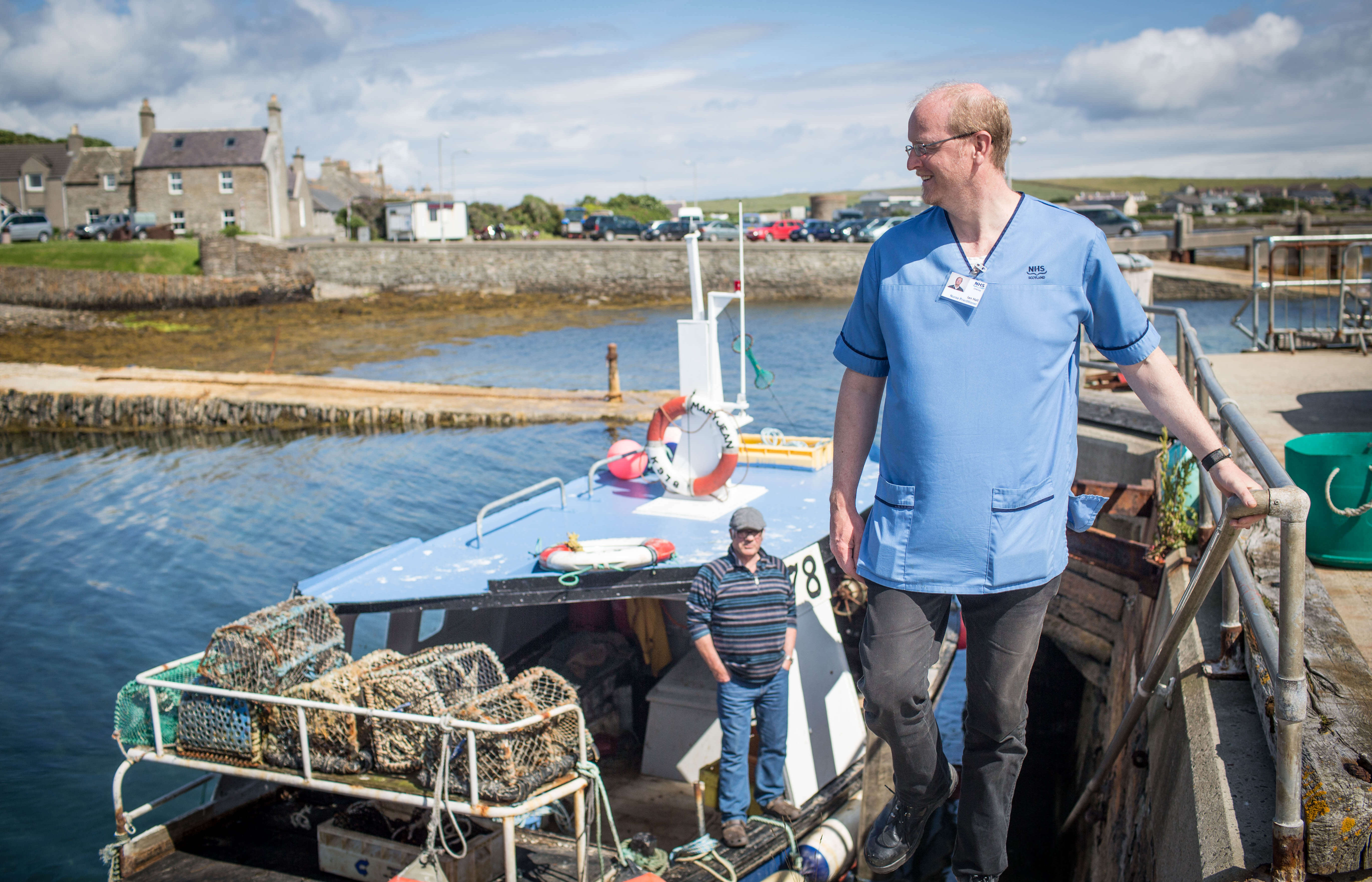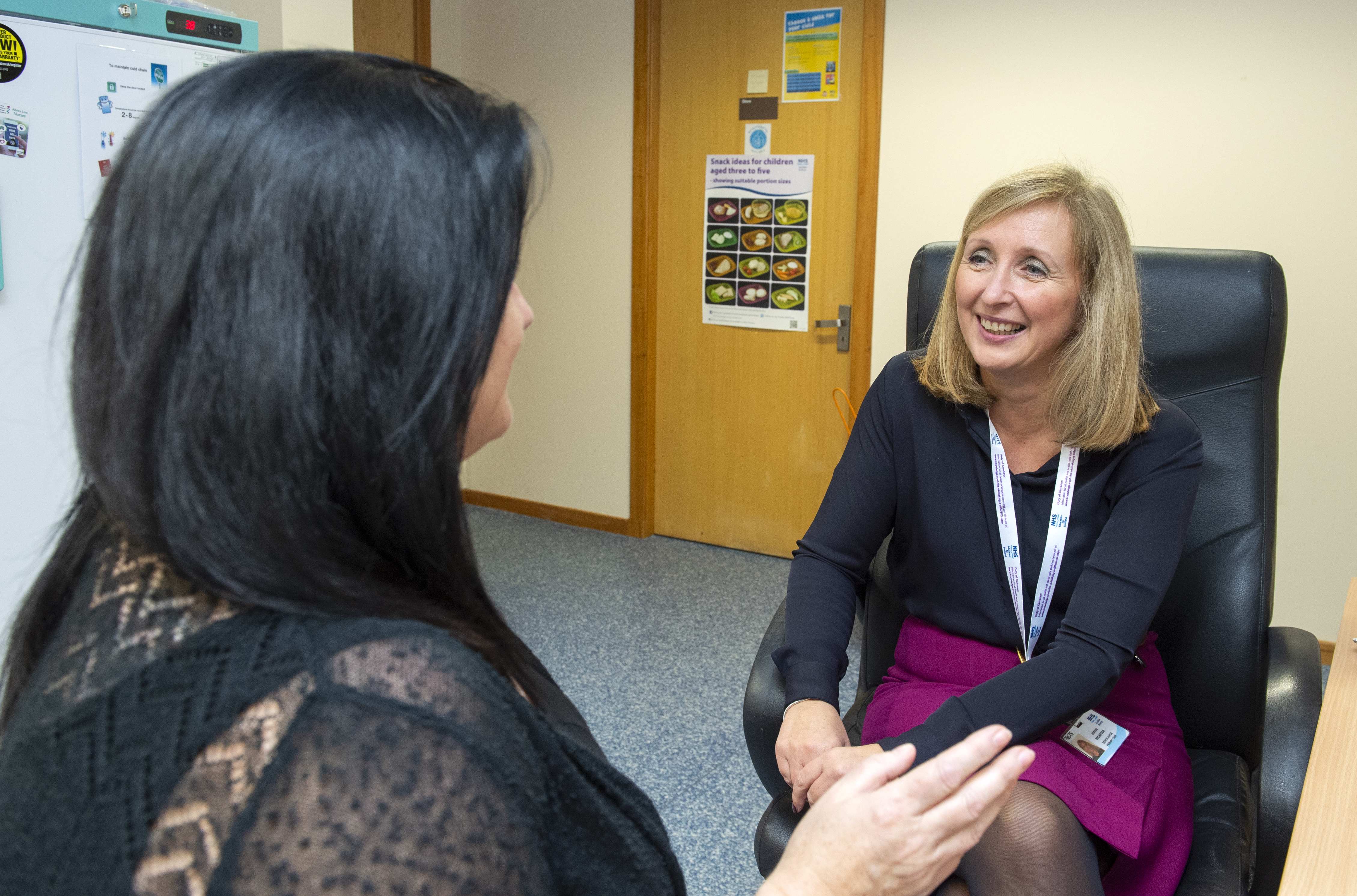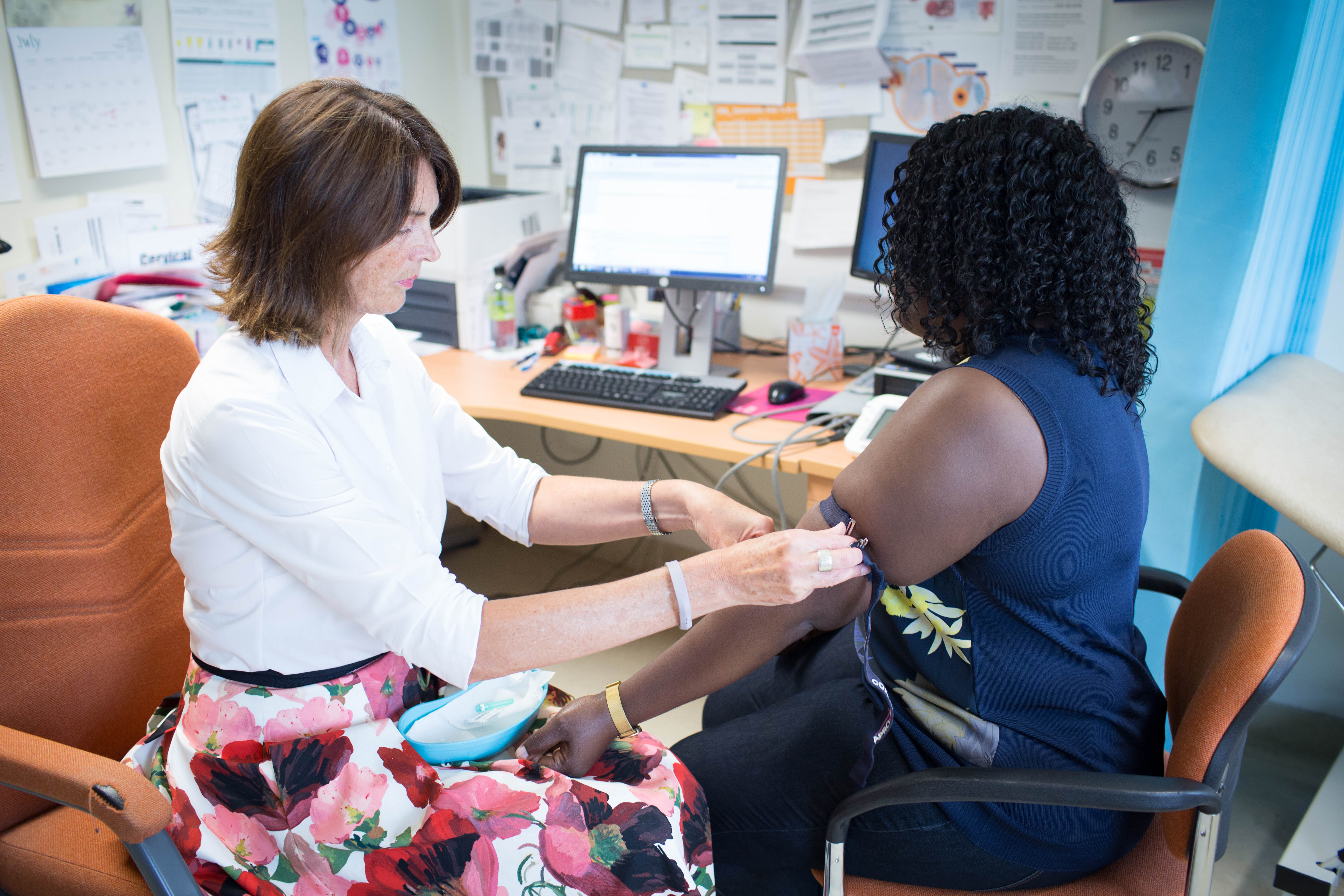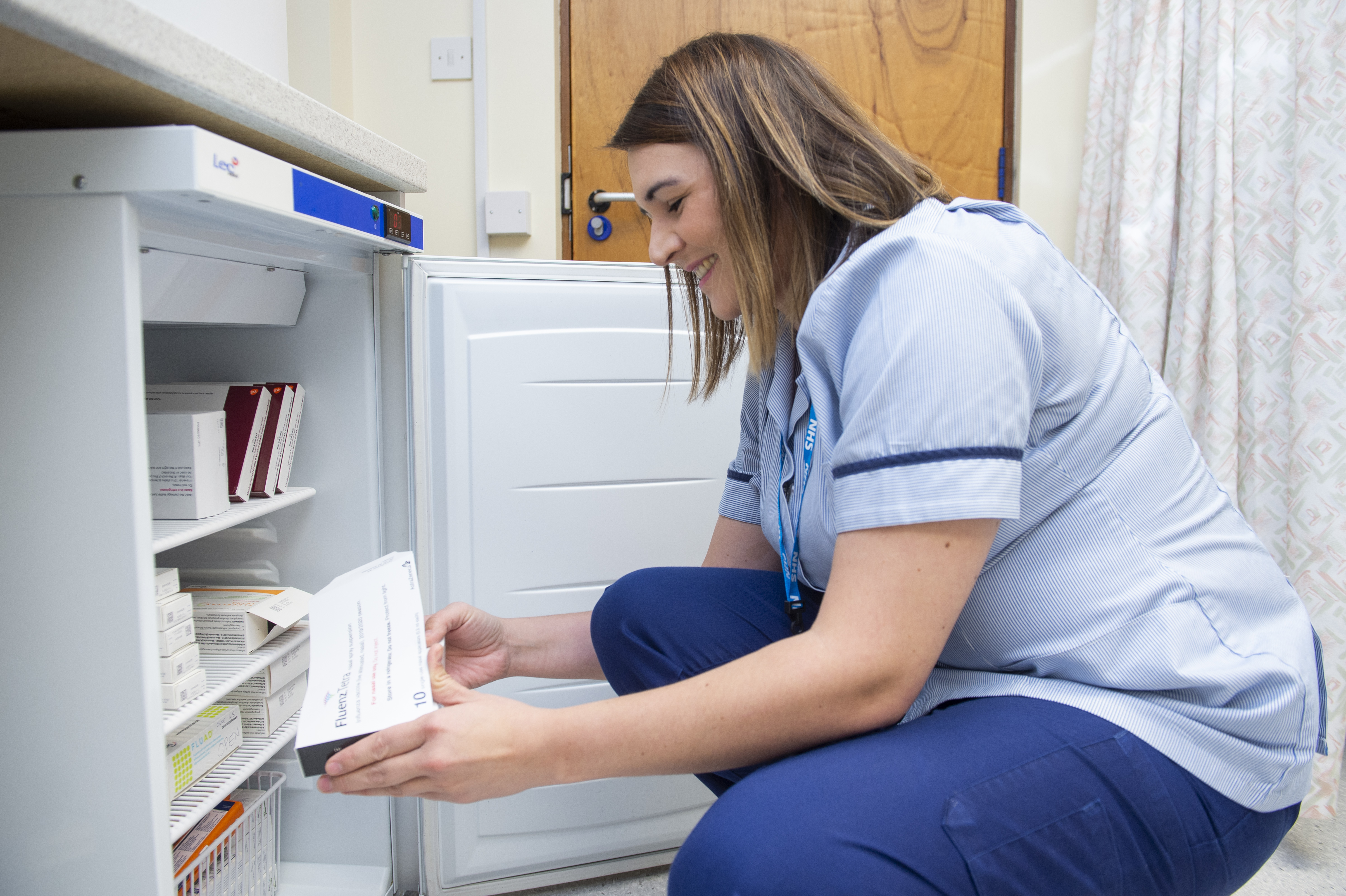
General Practice nurse
General practice nurses work in primary care and undertake a wide range of roles including health screening, sexual health, treating minor injuries, helping people self-manage long term conditions, and delivering vaccination programmes. They work with people of all ages including for example children with asthma, women seeking contraceptive advice, and people at end of life. General practice nurses often see people over many years and at different stages of their life and they can develop a deep knowledge of their local communities.

Joanne Anderson
Joanne was a General Practice Nurse in North Ayrshire. After 21 years in practice nursing, she was appointed NHS Ayrshire & Arran’s Senior Nurse for Primary Care.
I remember a conversation with my guidance teacher at school around career choices and wanting to be a nurse. I wanted to make people feel better. His disappointing response was that “it’s every schoolgirl’s dream to be a nurse” and he said I should have something to fall back on such as secretarial studies.
To be honest, I had little insight to what was involved and wrote to every hospital I could find in the phonebook looking for advice. I often tell this story and how I would have liked the opportunity to speak to my guidance teacher to let him know I did it. Despite what I considered a discouraging conversation; I am the first nurse in my family.
On qualifying, my hospital experience included respiratory medicine, surgical nursing, orthopaedics and gynaecology. I always managed to find additional interest supervising nursing and SVQ students, health promotion activity, creating patient pathways and new services and surgical bed management. However, it was not really until I started working in gynaecology that I developed an interest in reproductive and sexual health and sought out additional sessional work in this area. This really opened my eyes to working in the community and truly understanding what mattered to individuals and their family and as a nurse how we support people to be all they can be.
This led to my first General Practice Nurse (GPN) post entering a whole new world of nursing.
There is no such thing as a typical day in the life of a GPN and that’s the great thing about it. We see acutely unwell individuals, support individuals with long term and often complex conditions, health promotion and screening activity, immunisation, reproductive health, travel health – the list would be endless. Expert knowledge is paramount, and it is the combination of that expert knowledge with kindness and time taken to listen that really makes the difference in people’s lives.
General Practice nursing is a unique area of nursing. We care for individuals across all the age range. We are invited into people’s lives, form long-lasting and trusting relationships and are privileged to share and support people at times of great joy and great sorrow.
We have the chance to work with all ages – to see babies become young adults, have family of their own and perhaps even become grandparents. It’s fantastic to follow and support individuals and families on their journey.
The skillset of a GPN is vast, they are real expert generalists and the endurance athletes of the nursing profession. I love passing the kids when I’m walking to work and they give me a wave, when people seek me out to let me know they’re feeling better and when families let us know their loved one has passed on peacefully.
The focus of general practice is the health and wellbeing of the community we serve, and our practice populations are at the centre of everything we do. That enables us to bring compassion and professional expertise to addressing the needs of individuals, families and neighbourhoods over time.

Lorna Dhami
Lorna is the practice nurse, and practice manager, of one of the four practices at Easterhouse Health Centre in Glasgow.
It’s something of a family business, as the single-handed GP at the practice is also her husband, Dr Dav Dhami. “We know lots of the local population really well, we know their family dynamics, and how they’ll respond to what’s happening in their lives, and that’s a great help,” says Lorna.
“Our whole team, including the receptionists, go the extra mile to see people alright. It’s a very tight team.”
Easterhouse Health Centre serves one of the most socio-economically deprived communities in the country, and the practice that Lorna manages is one of the 100 Deep End practices that specialise in addressing poverty-related health need.
Having started out as a midwife, and following three children of her own, Lorna did a Practice Nursing degree at Glasgow Caledonian University and joined Dav in the surgery 22 years ago. Lorna spends her day providing practice nursing cover for 1,700 people on the practice list, the oldest of whom is 96.
In the early days, Easterhouse was predominantly white working class, but new housing developments, and Glasgow’s policy of taking in asylum seekers, has diversified the population considerably. “It’s a much more multicultural place now, the dynamic is changing, and it has been welcomed,” says Lorna.
Promoting and protecting health is Lorna’s priority. Clinical interventions – stitching, bandaging, ear syringing and the like – is delegated to the treatment room nurses, based elsewhere in the health centre. Lorna’s main task is to monitor patients living with chronic diseases such as diabetes, depression and heart disease, to dispense advice and assess those that pass through her door, and to screen for potentially fatal health problems.
Death rates from cancer are far higher in places like Easterhouse than in more prosperous communities, and Lorna is determined that as many people as possible take advantage of potentially life-saving screening tests for bowel cancer, breast cancer and cervical cancer.
She is notified of people on the practice list who don’t respond to screening invitations and takes every opportunity to engage them directly: she might see them at another clinic, or during an appointment, and will always raise it. “Sometimes people just have to have it explained to them personally,” she says. “They just need a gentle nudge.”
When the national bowel screening programme started, uptake among Lorna’s eligible patients was low at about 30%; thanks to her efforts it’s now nearing 50% and growing steadily.

Elaine Wilson
Riverside Medical Practice is a semi-rural practice located across three sites within NHS Ayrshire & Arran health board. I am employed as a General Practice Nurse (GPN) and the practice population is more than 4,000 patients. I qualified in 2015 with my last placement during training being with the District Nurse team at my current practice. I just fell in love with community nursing and was excited to be given the opportunity to start my first nursing role as a treatment room nurse. Now working as one of the practice nurses, I’m pleased to be part of an enthusiastic, forward thinking multidisciplinary team with a vision for the future of primary care.
I came into general practice straight after qualifying, I knew from a very early stage that it was where I belonged. Being involved in people’s care and helping improve their health and wellbeing across all life’s stages as well as supporting people at home and in their day-to-day life was something that really appealed to me. I started the role with a positive vision of how I can make a real difference to the people I meet. After just over a year as treatment room nurse, the practice asked if I would like to be GPN. The difference in these roles is that as the treatment room nurse, I was responsible for clinical tasks such as wound care, ear syringing, immunisations, and long-term condition monitoring. As practice nurse I support people with long term conditions, helping them self-manage, and live as well as possible with their condition. The knowledge needed to do my role is vast. I completed the NHS Education for Scotland GPN course, and I have also completed a Masters Module in long term conditions and I’m waiting to start a non-medical prescribing module. This level of education and knowledge allows me to work autonomously when caring for people with long term conditions. I also have a role in health promotion – such as sexual health, cervical screening, and immunisation.
Focussing on people living with long term conditions, I have helped to develop a new way of working to make sure people have the support they need long term. It is not a one size fits all and we are taking a more flexible approach to the care we offer, with the person in the driving seat. Allowing the individual to take responsibility for their care with our support, empowers people to live as full and healthy lives as possible. Finding out what is best for people and offering a choice of how their care is delivered has increased engagement which will lead to better outcomes. I am only four years qualified, and I know my learning will continue and I look forward to that. I care about being the best for people in my care, for me and for my profession.